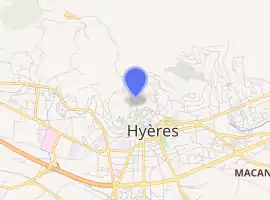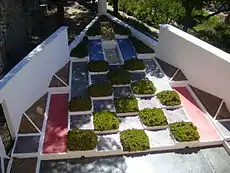Villa Noailles
Villa Noailles (French pronunciation: [vi.la no.aj]) is an early modernist house, built by architect Robert Mallet-Stevens for art patrons Charles and Marie-Laure de Noailles, between 1923 and 1927.[3] It is located in the hills above Hyères, in the Var, southeastern France.
| Villa Noailles | |||||||||||||
|---|---|---|---|---|---|---|---|---|---|---|---|---|---|
.JPG.webp) The Villa Noailles (1923-1926) | |||||||||||||

| |||||||||||||
| General information | |||||||||||||
| Architectural style | International style | ||||||||||||
| Town or city | Hyères | ||||||||||||
| Country | France | ||||||||||||
| Coordinates | 43°07′26″N 6°07′38″E | ||||||||||||
| Construction started | 1923 | ||||||||||||
| Completed | 1928 | ||||||||||||
| Renovated | 1991; 1997 | ||||||||||||
| Client | Marie-Laure and Charles de Noailles | ||||||||||||
| Owner | Commune of Hyères | ||||||||||||
| Technical details | |||||||||||||
| Floor area | 1,800 m2 (19,000 sq ft) | ||||||||||||
| Design and construction | |||||||||||||
| Architect | Robert Mallet-Stevens | ||||||||||||
| Website | |||||||||||||
| www | |||||||||||||
| |||||||||||||
| References | |||||||||||||
| [1][2] | |||||||||||||
History
Charles de Noailles was born in 1891, his wife Marie-Laure in 1902. They were married in 1923. Before their marriage, they became friends of artist-filmmaker Jean Cocteau, and Noailles commissioned a portrait of his wife by Pablo Picasso in 1923.
In 1923, they signed a contract with the architect Robert Mallet-Stevens to build a summer villa in the hills above the city of Hyères. Construction took three years, and eventually also included a triangular Cubist garden designed by Gabriel Guevrekian.
The main artists noticed at the Salon des artistes décorateurs of 1924 for their integrated furnitures were commissioned. The decoration included furnitures bought or made specially for the villa, by Mallet-Stevens himself with his armchair « Transat » created for the swimming pool, by Djo-Bourgeois, Francis Jourdain, Pierre Legrain, Pierre Chareau, Jean Prouvé, Eileen Gray, Charlotte Perriand, Dominique (Marie André Domin), Sybold van Ravesteyn and Theo van Doesburg from De Stijl, the Wassily Chair of Marcel Breuer, or from the brands Smith & Co and Ronéo, as well as textiles by Raoul Dufy and Sonia Delaunay, luminaires by Jean Perzel, ironworks by Claudius Linossier, stained glass by Louis Barillet and pieces of art : sculptures by Jean and Joël Martel, Henri Laurens, Constantin Brancusi, Alberto Giacometti, Jacques Lipchitz, paintings by Mondrian or Braque, etc.

Throughout the 1920s and 1930s, the couple were important patrons of modern art, particularly surrealism; they supported film projects by Man Ray, Salvador Dalí, and Luis Buñuel; and commissioned paintings, photographs and sculptures by Balthus, Giacometti, Constantin Brâncuși, Miró, and Dora Maar. Villa Noailles features prominently in Man Ray's film Les Mystères du Château de Dé.
In 1940 the villa was occupied by the Italian Army and turned into a hospital. From 1947 until 1970, the villa was the summer residence of Marie-Laure. She died in 1970, and the house was purchased by the city of Hyères in 1973. Charles de Noailles died in 1981. The villa is now used as an arts center and for special exhibits.
James Lord was a guest there in the mid-fifties. In his book Picasso and Dora: a memoir he writes: "...an undistinguished cubist extravaganza of reinforced concrete set atop a high hill, within the ancient walls of a Saracen fortress. It had been designed in the late twenties by a fashionable architect named Mallet-Stevens, contained something like fifty rooms and was surrounded by a large garden." He recalls the room, where Marie-Laure tried to seduce him: "...a large salon at Saint-Bernard which had no windows but was lighted from above by a bizarre cubist skylight which occupied almost all the ceiling, adding to the sense of existing outside time in a stranded ocean liner." The beauty of the location did not help, however, the "redoutable viscountess" in conquering his chastity.
References
- Base Mérimée: Villa Marie-Laure-de-Noailles ou château Saint-Bernard à Hyères, Ministère français de la Culture. (in French)
- Base Mérimée: Maison dite Clos Saint-Bernard ou villa Noailles, Ministère français de la Culture. (in French)
- "Villa Noailles".
Further reading
- Briolle, Cécile; Fuzibet, Agnès; Monnier, Gérard (1990). La Villa Noailles : Rob Mallet-Stevens (in French). Marseille, France: Editions Parenthéses. ISBN 9782863640531.
- Carrassan, François (1990). Noailles et les modernes : les traces d'un style (in French). Hyères France: Or des îles. ISBN 9782908642001.
- Plossu, Bernard; Carrassan, François (4 February 2010). L'improbable destin de la villa Noailles (in French). Images en manoeuvres.
- Carrassan, François (2001). La Villa Noailles: une aventure moderne (in French). Plume.
External links
 Media related to Villa Noailles at Wikimedia Commons
Media related to Villa Noailles at Wikimedia Commons- VillaNoailles - the site of Villa Noailles
- Pictures of the Villa